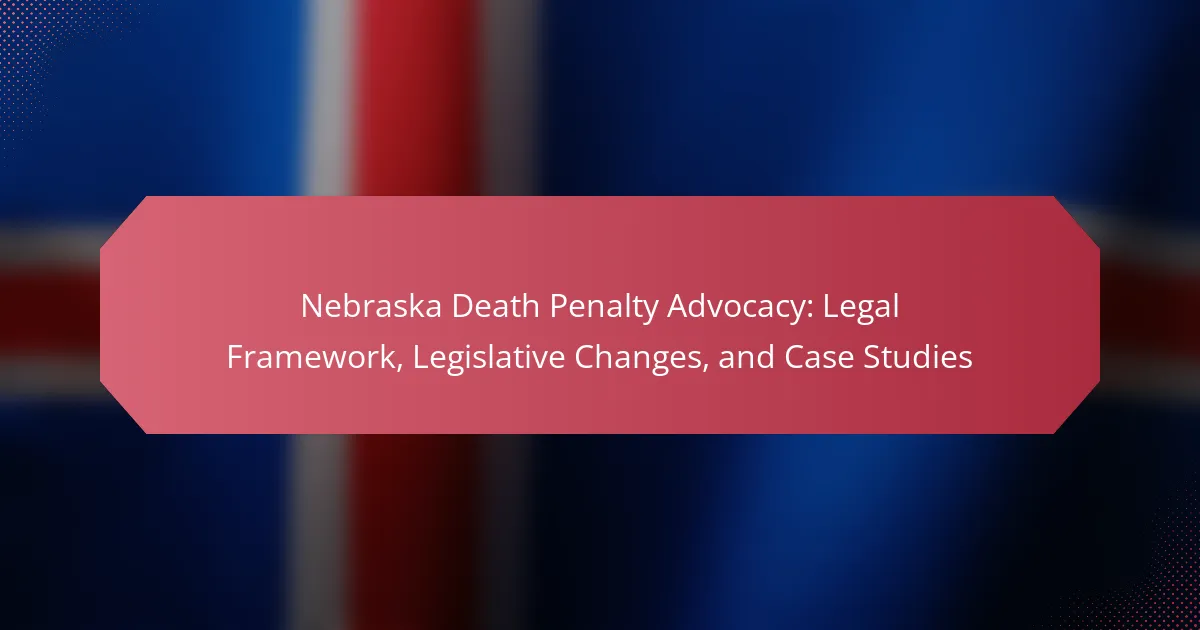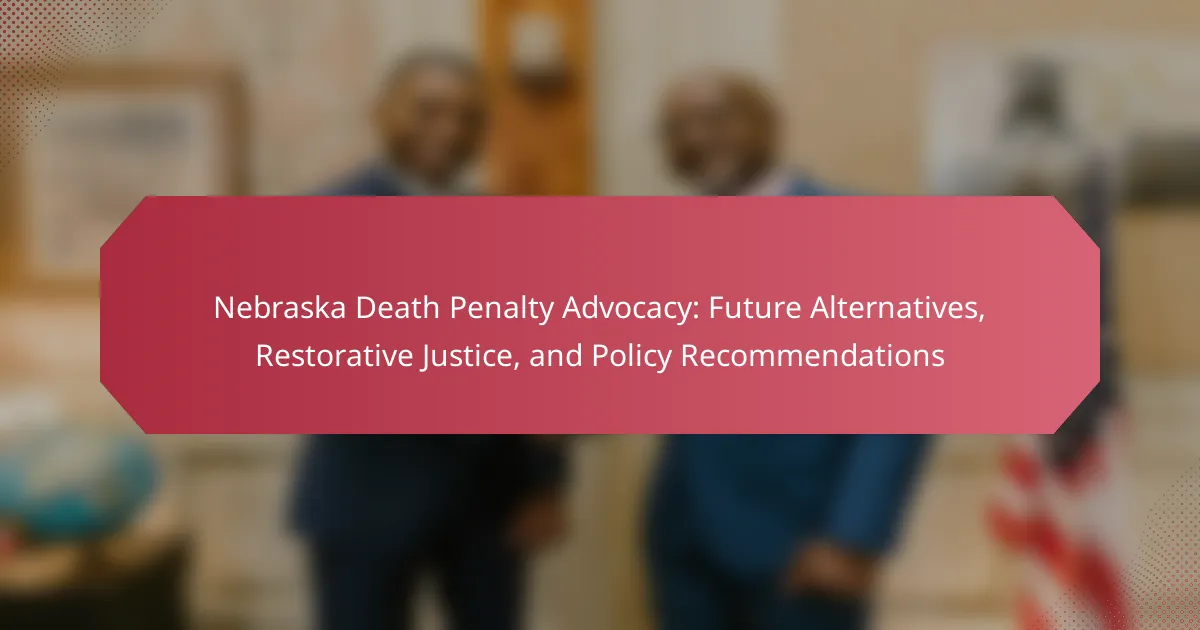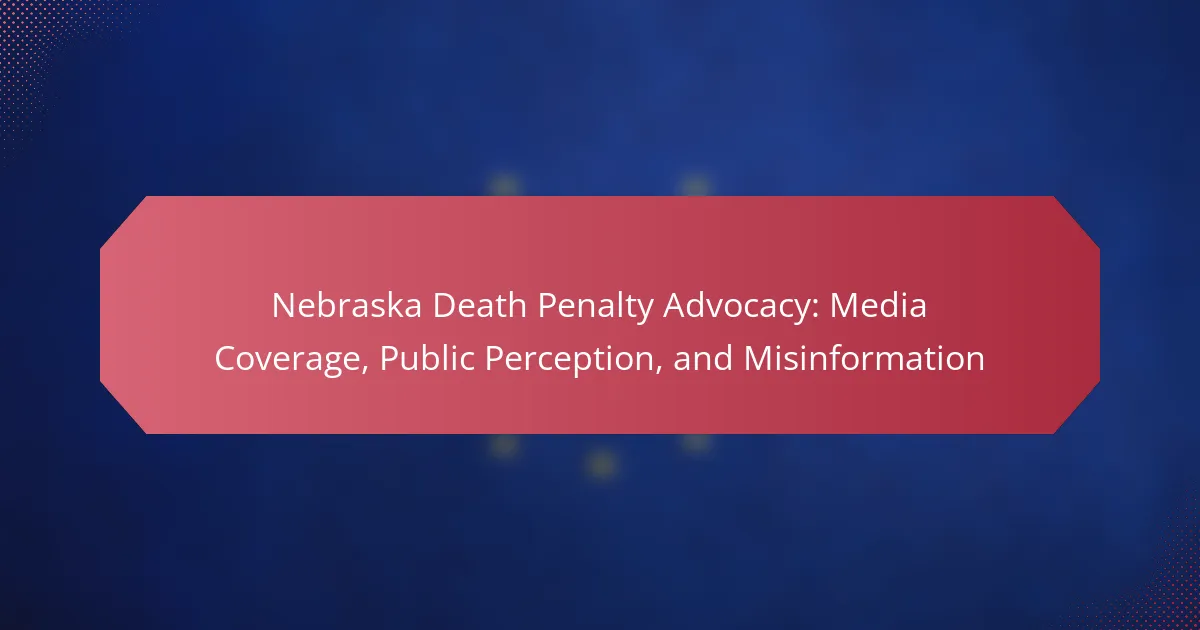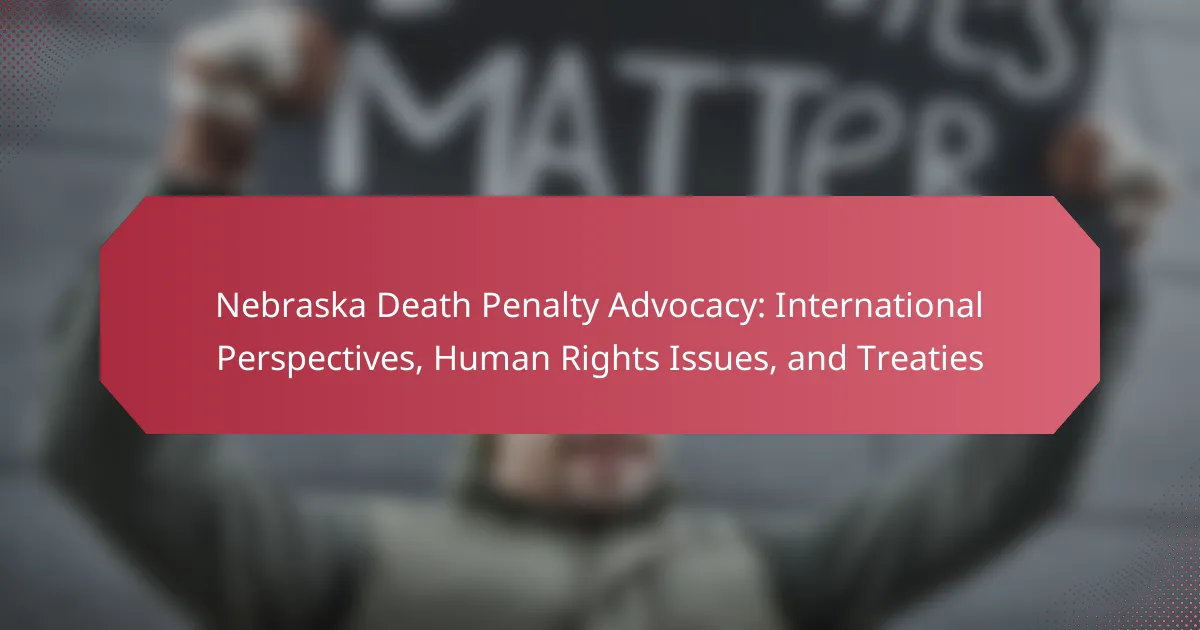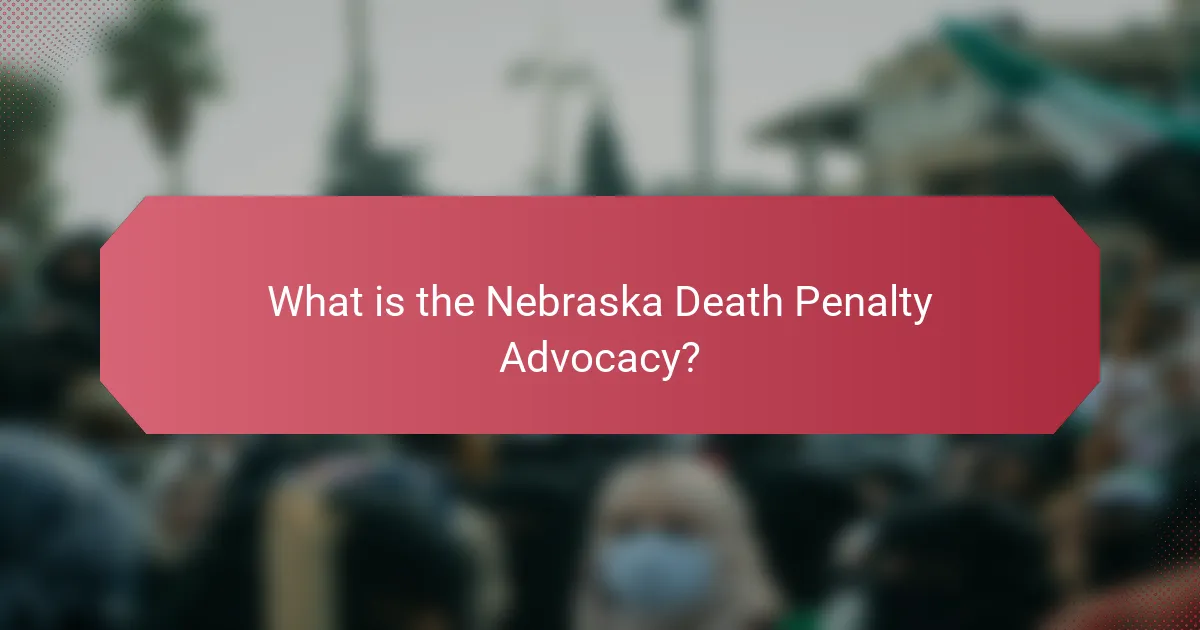
What is the Nebraska Death Penalty Advocacy?
Nebraska Death Penalty Advocacy refers to the efforts to support or oppose the death penalty in Nebraska. This advocacy involves legal, political, and social dimensions. Organizations and individuals engage in campaigns to influence legislation surrounding capital punishment. They may work to uphold the death penalty or push for its repeal. The advocacy is shaped by public opinion, ethical considerations, and legal challenges. Historical context includes significant legislative changes, such as the repeal of the death penalty in 2015, which was later reinstated in 2016. These events highlight the dynamic nature of the death penalty debate in Nebraska.
How does the Nebraska death penalty advocacy operate within the legal system?
Nebraska death penalty advocacy operates through legislative efforts and legal challenges. Advocates promote policies to maintain or abolish capital punishment. They engage in lobbying state lawmakers to influence legislation. Advocacy groups also provide public education on the implications of the death penalty. Legal challenges often arise in response to execution methods and sentencing procedures. Court cases can reshape the application of the death penalty in Nebraska. For instance, the Nebraska Supreme Court has ruled on the constitutionality of certain laws. These rulings directly impact how capital punishment is enforced in the state.
What are the key legal principles governing the death penalty in Nebraska?
The key legal principles governing the death penalty in Nebraska include the requirement of due process and the prohibition of cruel and unusual punishment. The Nebraska Constitution allows for the death penalty under specific circumstances. The U.S. Supreme Court decisions, such as Furman v. Georgia and Atkins v. Virginia, influence Nebraska’s application of capital punishment. Nebraska law mandates that the death penalty can only be imposed for first-degree murder. Additionally, the state requires a unanimous jury recommendation for a death sentence. The legal framework emphasizes the importance of appeals and post-conviction relief. Nebraska also has specific protocols for execution methods, which have been subject to legal challenges. These principles collectively shape the administration and enforcement of the death penalty in the state.
How do advocacy groups influence the legal framework of the death penalty?
Advocacy groups influence the legal framework of the death penalty by campaigning for legislative changes and public awareness. They conduct research to highlight issues related to wrongful convictions and racial bias. These groups often provide legal assistance to death row inmates. They mobilize public opinion through media campaigns, aiming to shift perceptions about capital punishment. In Nebraska, advocacy efforts led to the repeal of the death penalty in 2015. This repeal was driven by grassroots movements and public sentiment against the death penalty. Studies show that states with active advocacy groups often see changes in death penalty laws. Advocacy groups play a crucial role in shaping the dialogue around capital punishment and its legal implications.
What historical context shapes the current death penalty advocacy in Nebraska?
The historical context shaping current death penalty advocacy in Nebraska includes legislative changes and public sentiment. In 1972, the Nebraska Supreme Court declared the death penalty unconstitutional. This decision was reversed in 1979, reinstating capital punishment. The 1990s saw a rise in executions, reflecting a tough-on-crime approach. However, in 2015, the Nebraska Legislature voted to abolish the death penalty, citing moral and financial concerns. Voters reinstated it in 2016 through a ballot initiative. This back-and-forth reflects ongoing debates over ethics, effectiveness, and public safety. The changing legal landscape influences current advocacy efforts, highlighting a complex relationship between law and public opinion in Nebraska.
What significant legislative changes have occurred in Nebraska’s death penalty laws?
In 2015, Nebraska’s legislature passed a bill to abolish the death penalty. This change was significant as it marked a shift in the state’s approach to capital punishment. Governor Pete Ricketts vetoed the bill, but the legislature overrode the veto. This made Nebraska the first conservative state to abolish the death penalty in over 40 years. In 2016, a referendum was held, and voters reinstated the death penalty. This reinstatement reflected a complex relationship between public opinion and legislative action on capital punishment in Nebraska.
How have public opinions evolved regarding the death penalty in Nebraska?
Public opinions regarding the death penalty in Nebraska have shifted significantly over the years. Historically, support for the death penalty was high among Nebraskans. However, recent surveys indicate a growing trend towards opposition. A 2020 poll showed that 60% of respondents favored life imprisonment over the death penalty. This change reflects broader national trends against capital punishment. Legislative actions also mirror these evolving sentiments. In 2015, Nebraska’s legislature voted to abolish the death penalty, although this decision was later reversed by a referendum. The referendum revealed a divided public, with 61% voting to reinstate capital punishment. Overall, public opinion has become increasingly complex, balancing traditional support with rising ethical concerns.
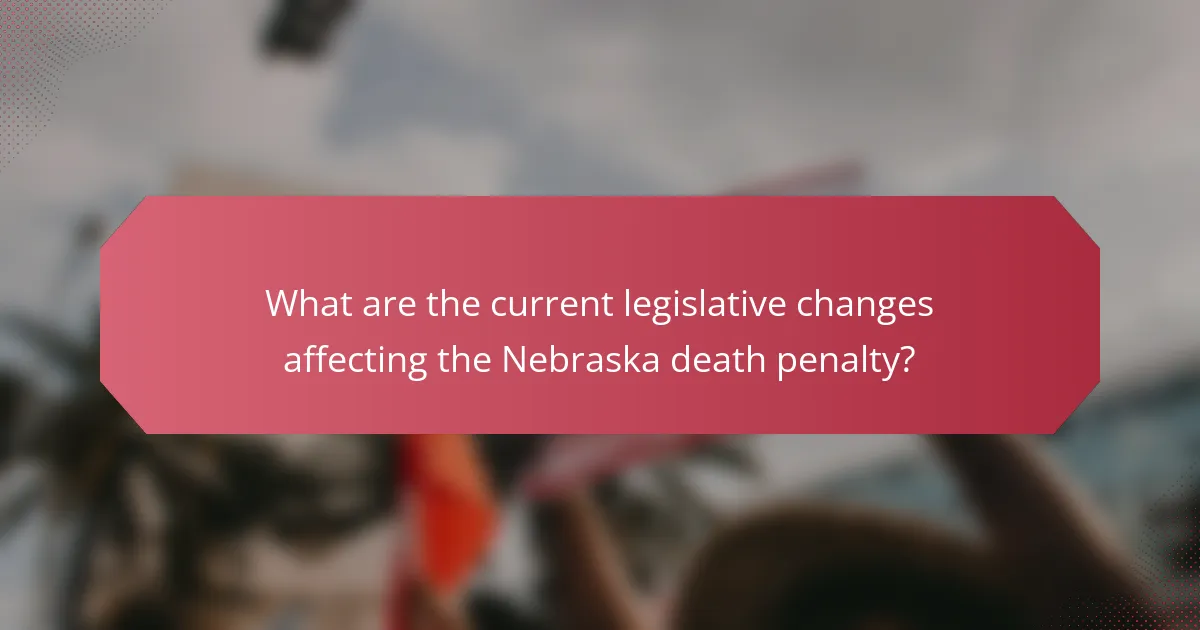
What are the current legislative changes affecting the Nebraska death penalty?
Recent legislative changes in Nebraska have focused on the death penalty’s status and application. In 2015, Nebraska lawmakers voted to abolish the death penalty, overriding a veto from the governor. This decision followed a long-standing debate on its ethical implications and effectiveness. However, in 2016, a voter referendum reinstated the death penalty, reflecting public support for capital punishment. Currently, discussions continue regarding potential reforms aimed at addressing issues like wrongful convictions and execution methods. These legislative actions illustrate the ongoing evolution of the death penalty in Nebraska.
How do recent legislative changes impact the administration of the death penalty?
Recent legislative changes have significantly impacted the administration of the death penalty in Nebraska. The state has seen a shift towards more restrictive measures regarding capital punishment. For instance, legislation has been introduced to limit the methods of execution and increase transparency in the process. Additionally, recent laws aim to enhance the appeals process for death row inmates. These changes reflect a growing trend in Nebraska to reconsider the death penalty’s application. The Nebraska Legislature has also passed measures to address concerns about wrongful convictions and the ethical implications of capital punishment. Such legislative adjustments are indicative of a broader national dialogue surrounding the death penalty’s future.
What specific laws were enacted or repealed in recent years?
In recent years, Nebraska enacted Legislative Bill 268, which abolished the death penalty in 2015. This law replaced capital punishment with a sentence of life imprisonment without parole. The repeal was a significant shift in Nebraska’s legal framework regarding capital punishment. Prior to this, the death penalty had been reinstated in 2013 after a previous repeal. The 2015 law reflects changing attitudes toward the death penalty in Nebraska.
How do these changes align with national trends in death penalty legislation?
Recent changes in Nebraska’s death penalty legislation reflect a broader national trend toward abolition or moratorium. Many states are reevaluating their death penalty laws due to concerns over wrongful convictions and racial bias. In 2021, for instance, Virginia abolished the death penalty, joining several other states that have enacted similar measures. Public opinion is shifting, with a growing number of Americans favoring alternatives to capital punishment. This shift is evidenced by a decrease in executions and new moratoriums in states like California and Pennsylvania. Nebraska’s legislative changes align with these trends by emphasizing a move towards reform and reconsideration of capital punishment’s efficacy and morality.
What role do advocacy organizations play in legislative changes?
Advocacy organizations play a crucial role in legislative changes by influencing policymakers and public opinion. They engage in lobbying efforts to promote specific legislative agendas. These organizations often conduct research to provide data that supports their positions. They mobilize grassroots campaigns to raise awareness and generate public support. Advocacy groups also form coalitions to amplify their impact on legislative processes. For example, organizations focused on the death penalty have successfully advocated for reforms in various states. Their efforts can lead to significant changes in laws and policies. Research indicates that advocacy organizations can effectively shape legislation through strategic communication and sustained engagement.
Which organizations are most influential in Nebraska’s death penalty advocacy?
The most influential organizations in Nebraska’s death penalty advocacy include the Nebraska Attorney General’s Office and the Nebraska Crime Commission. The Nebraska Attorney General’s Office actively defends the state’s death penalty laws. They provide legal representation in cases involving capital punishment. The Nebraska Crime Commission supports law enforcement initiatives that include the death penalty. Additionally, organizations like the Nebraska Family Alliance advocate for the retention of capital punishment. These organizations influence legislation and public opinion regarding the death penalty in Nebraska. Their efforts shape policies and legal frameworks surrounding capital punishment in the state.
How do these organizations mobilize public support for or against the death penalty?
Organizations mobilize public support for or against the death penalty through various strategies. They utilize public awareness campaigns to educate citizens about the implications of capital punishment. These campaigns often include social media outreach, informational pamphlets, and community events. They also engage in lobbying efforts to influence lawmakers and public policy. By forming coalitions with other advocacy groups, they amplify their message. Research shows that public opinion can shift significantly through targeted messaging and personal stories. For instance, organizations may highlight wrongful convictions to argue against the death penalty. They also often provide platforms for victims’ families to share their experiences. This multifaceted approach helps to build a broad base of support or opposition.
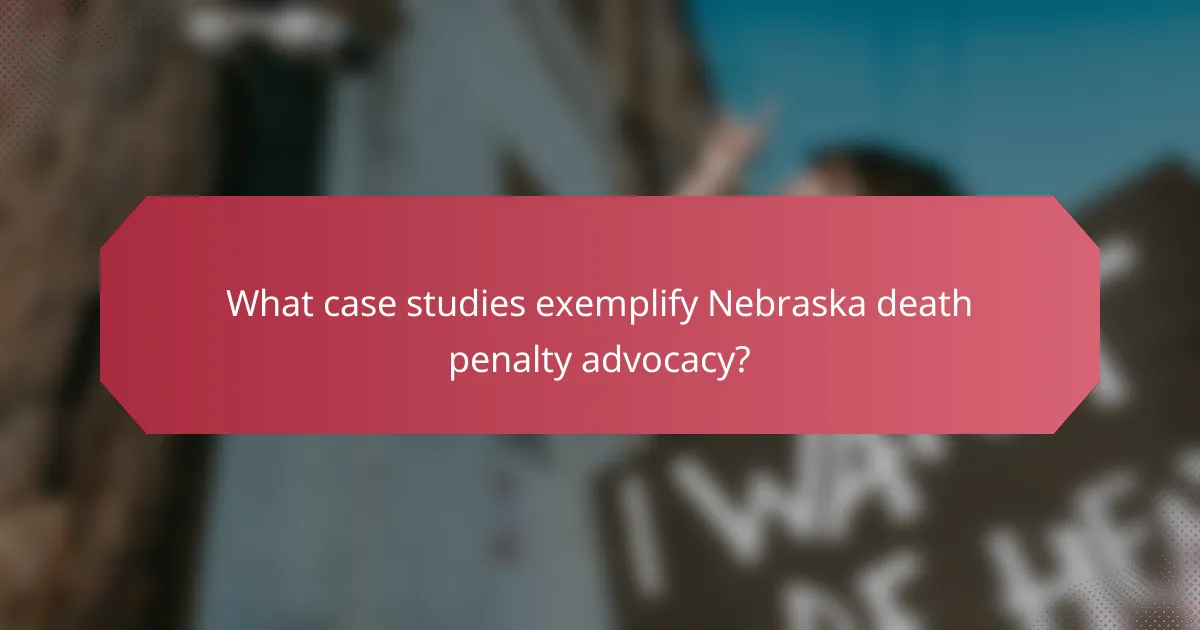
What case studies exemplify Nebraska death penalty advocacy?
Several case studies exemplify Nebraska death penalty advocacy. The case of State v. Mata highlighted issues surrounding the execution method. This case involved the challenge of lethal injection protocols. In 2015, the Nebraska Legislature voted to repeal the death penalty. However, advocacy efforts led to a successful ballot initiative in 2016. This initiative reinstated the death penalty in Nebraska. Another significant case is State v. McCoy, which focused on the application of the death penalty in specific murder cases. These cases illustrate the ongoing advocacy and legal complexities surrounding the death penalty in Nebraska.
How have landmark cases influenced death penalty advocacy in Nebraska?
Landmark cases have significantly shaped death penalty advocacy in Nebraska. The case of State v. Mata in 2008 highlighted issues of mental competency and execution standards. This ruling prompted advocates to push for reforms in how mental health is assessed in capital cases. Additionally, the 2015 Nebraska Supreme Court ruling in State v. Moore addressed the constitutionality of the death penalty itself. This decision led to increased discussions about the morality and legality of capital punishment in the state. The influence of these cases has mobilized both supporters and opponents of the death penalty. Advocacy strategies have evolved in response to these judicial decisions. Consequently, landmark cases have been pivotal in framing the ongoing legal and ethical debates surrounding the death penalty in Nebraska.
What were the outcomes of significant death penalty cases in Nebraska?
Nebraska has seen several significant death penalty cases with varied outcomes. In 2008, the Nebraska Supreme Court ruled in favor of Anthony Garcia, overturning his death sentence due to prosecutorial misconduct. In 2015, the state executed Michael Ryan, marking the first execution in Nebraska since 1997. In 2016, the Nebraska legislature voted to abolish the death penalty, overriding Governor Pete Ricketts’ veto. In 2018, the Nebraska Supreme Court upheld the law abolishing the death penalty, affirming the change in legal status. These cases reflect the ongoing debate and evolving legal landscape surrounding the death penalty in Nebraska.
How did these cases shape public and legislative attitudes towards the death penalty?
High-profile cases have significantly influenced public and legislative attitudes towards the death penalty. Cases that highlighted wrongful convictions led to increased public skepticism about capital punishment. For example, the exoneration of individuals on death row raised concerns about the reliability of the justice system. Legislative responses included moratoriums and repeals of the death penalty in several states. Public opinion polls showed growing support for alternatives to capital punishment. Advocacy groups used these cases to push for reforms, emphasizing human rights and the risk of executing innocent people. This shift resulted in a more cautious approach to death penalty legislation. Overall, these cases catalyzed a broader debate about morality and efficacy in capital punishment.
What lessons can be learned from Nebraska’s death penalty case studies?
Lessons from Nebraska’s death penalty case studies highlight issues of fairness and efficacy. Case studies reveal disparities in sentencing based on race and socioeconomic status. They show that wrongful convictions can occur, leading to irreversible consequences. The studies illustrate the high financial costs associated with death penalty cases compared to life imprisonment. Additionally, they emphasize the importance of thorough legal representation. These lessons suggest a need for reform in the legal framework surrounding capital punishment. They also indicate that public opinion is shifting towards alternatives to the death penalty. Overall, Nebraska’s case studies provide critical insights into the complexities of capital punishment.
What strategies have proven successful in advocating for or against the death penalty?
Successful strategies in advocating for or against the death penalty include public awareness campaigns and legislative lobbying. Public awareness campaigns educate the public on the moral and practical implications of the death penalty. These campaigns often use personal stories and statistics to humanize the issue. Legislative lobbying involves working directly with lawmakers to influence policy changes. Advocacy groups often provide research and data to support their positions during legislative sessions. Legal challenges have also been effective in questioning the constitutionality of the death penalty. In Nebraska, for example, the 2015 repeal of the death penalty was influenced by these strategies. Organizations like the American Civil Liberties Union have played a key role in these efforts.
How can these lessons inform future advocacy efforts in Nebraska and beyond?
Lessons from past advocacy efforts can shape future initiatives in Nebraska and beyond. Understanding the legal framework and legislative changes is crucial. For example, the repeal of the death penalty in Nebraska in 2015 illustrates the impact of grassroots mobilization. This repeal was driven by a coalition of advocacy groups, demonstrating the effectiveness of collaboration. Future efforts can leverage this model by uniting diverse stakeholders. Additionally, case studies highlighting successful campaigns provide valuable strategies. These include targeted messaging and community engagement tactics. Research indicates that informed advocacy leads to more effective policy change. Therefore, applying these lessons can enhance future advocacy outcomes.
What best practices can be applied to death penalty advocacy in Nebraska?
Best practices for death penalty advocacy in Nebraska include thorough research on legal precedents, effective communication strategies, and community engagement. Advocates should stay informed about changes in legislation and relevant court rulings. Utilizing data to support arguments can strengthen advocacy efforts. Building coalitions with like-minded organizations enhances visibility and impact. Engaging with lawmakers through direct outreach can influence policy discussions. Public awareness campaigns can educate citizens about the implications of the death penalty. Lastly, providing support for individuals affected by capital punishment ensures a compassionate approach to advocacy.
Nebraska Death Penalty Advocacy encompasses the legal, political, and social efforts surrounding capital punishment in Nebraska, highlighting the ongoing debates and legislative changes. The article examines the operational framework of advocacy groups, key legal principles, historical context, and significant legislative shifts, including the repeal and reinstatement of the death penalty. It also explores the influence of public opinion, landmark cases, and advocacy organizations on the legal landscape of capital punishment. Case studies illustrate the complexities and evolving attitudes toward the death penalty, providing insights into effective advocacy strategies and lessons for future efforts.
